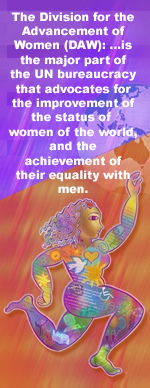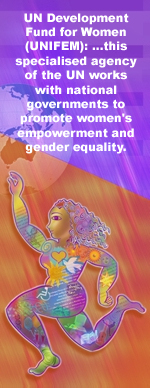Woman of the World - The UN
Woman of the World -
Know Your International Human Rights
- Preface
- What are human rights?
- What is the United Nations?
- The UN: Protecting the rights of woman
- What is CEDAW
- Australia's signing of CEDAW
- A guide to the rights in CEDAW
- CEDAW and the Sex Discrimination Act
- The Optional Protocol to CEDAW
- What about Beijing?
- What can you do: The public sphere
- What can you do: Private actions
 The United Nations (UN) deals with many aspects of human rights and other international issues. Several specialised departments and agencies have been established within the UN to deal specifically with concerns relating to women.
The United Nations (UN) deals with many aspects of human rights and other international issues. Several specialised departments and agencies have been established within the UN to deal specifically with concerns relating to women.
The Commission on the Status of Women (CSW):
The CSW is an intergovernmental body that forms part of the Economic and Social Council of the UN (ECOSOC). Established in1946, its function is to prepare recommendations and reports on promoting women's rights in political, economic, civil, social and educational fields with the object of promoting equality between men and women.
The CSW consists of 45 members elected by the ECOSOC for a period of four years. Members, who are nominated by their respective national governments, are elected on the following basis: thirteen from African states; eleven from Asian states; four from Eastern European states; nine from Latin American and Caribbean states; and eight from Western European and other states. The CSW meets on an annual basis for a period of eight working days.
The UN website for the latest updates on women's human rights issues, programs and campaigns is: http://www.un.org/womenwatch
The Division for the Advancement of Women (DAW):
The DAW is part of the UN Secretariat and specialises in issues concerning the status of women. It is the major part of the UN bureaucracy that advocates for the improvement of the status of women of the world, and the achievement of their equality with men.
 The DAW works with all international Conventions and Treaties relating to women, including CEDAW, and the CEDAW Optional Protocol. The DAW acted as the substantive secretariat for the Fourth World Conference on Women in Beijing (1995). This was the largest conference in the history of the UN. The DAW was also responsible for the preparations for the three previous World Conferences on Women (Mexico, 1975, Copenhagen, 1980, and Nairobi, 1985). Recently the DAW was involved in the preparatory work for the 23rd Special Review Session of the UN General Assembly in 2000, commonly known as Beijing + 5.
The DAW works with all international Conventions and Treaties relating to women, including CEDAW, and the CEDAW Optional Protocol. The DAW acted as the substantive secretariat for the Fourth World Conference on Women in Beijing (1995). This was the largest conference in the history of the UN. The DAW was also responsible for the preparations for the three previous World Conferences on Women (Mexico, 1975, Copenhagen, 1980, and Nairobi, 1985). Recently the DAW was involved in the preparatory work for the 23rd Special Review Session of the UN General Assembly in 2000, commonly known as Beijing + 5.
The UN website address for DAW is: http://www.un.org/womenwatch/daw
UN Development Fund for Women (UNIFEM):
Commonly known as UNIFEM, this specialised agency of the UN works with national governments to promote women's empowerment and gender equality. UNIFEM's mandate is based on international women's rights documents, particularly CEDAW.
Since its creation in 1976, UNIFEM has supported numerous projects and initiatives throughout the developing world that promote the political, economic, and social empowerment of women. These have ranged from small grassroots enterprises that improved working conditions for women to public education campaigns and the design of new gender-sensitive laws and marketing campaigns.
Further information on UNIFEM is available from: http://www.unifem.undp.org

